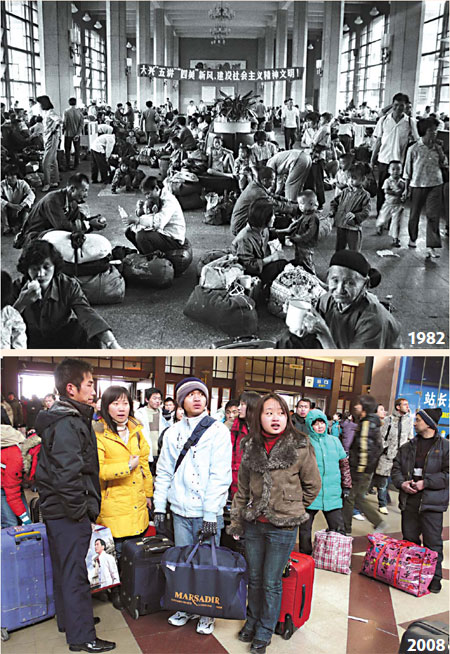
|
BIZCHINA> Wen's Lens
 |
|
Tracks of change
By You Nuo (China Daily)
Updated: 2008-12-29 07:48
 For the railway industry, some words and phrases essentially mean the same thing - be it development, modernization, reform or change. They all mean the job of carrying rural people into the cities - hundreds of thousands, time after time - to find new jobs, lives and homes.
Travel was costly and tiring. An average scene of the Beijing Railway Station, then the largest and most modern of the country (and still one of the largest), as in our 1982 black-and-white photo, shows no trace of the future trend. People from villagers and small cities just sat in ramshackle clusters on the lobby floor with simple luggage and home-made snacks. Despite the hanging propaganda banner to promote the so-called socialist spiritual civilization, some were sitting on the dirty floor littered with waste paper. Everybody was in a transient mood. They knew they were soon to go when the boarding whistle blew and this was not a place where they belonged. In fact, in 1982, the redistribution of collective farms to private management had yet to become a sweeping change. People were only beginning to make a little more income than the 1970s and could afford a few more colorful clothes. The phrase "market economy" was still taboo. Having millions of villagers leaving their farm jobs was something hardly anyone could have imagined. But as a result of the successful rural reform projects, first in Sichuan and Anhui provinces, then nationwide, the rise in farm productivity was able to raise a tremendous pool of labor for the industrial development in the cities. Nowadays, in many villages, farming is only reserved for the older people and providers of specialized services. All the young people (who would have been called "able-bodied farm workers") have gone to work in the cities, on fulltime or temporary contracts. In 2007, in an official survey, rural families reported at least 130 million of their members working on longer contracts in the cities - after some families had already entirely moved out of their old villages. The favorite destinations of many migrant workers are the large cities in the coastal and near-coast areas (such as Beijing). They want to stay in those cities. They want to be part of the modern China. Correspondingly, in the last 30 years, Beijing has built two more large railway stations - the Beijing West and Beijing South - with the one where our 1982 photo was taken still carrying the name Beijing Railway Station.
 (For more biz stories, please visit Industries)
|